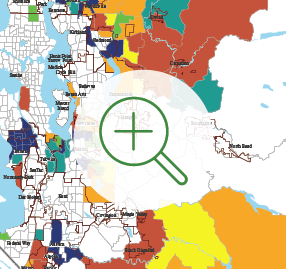

|
MULTICULTURAL
Multicultural Behavior Study
|

|
Waste Management is expanding its first-of-its-kind recycling behavior study to
the Latino community in an effort to learn more about habits and beliefs regarding
recycling and composting. Planning for the study was implemented in 2014; the
team narrowed the focus audience, identified a multicultural research partner and
created the design and methodology for the study. To narrow the focus audience,
Waste Management conducted a thorough Geographic Information Systems
(GIS) and American Community Survey (ACS) analysis and mapped the language
proficiency for King and Snohomish Counties. This data analysis helped Waste
Management and King and Snohomish Counties select Spanish-speaking residents
as the primary focus of the multicultural behavior study. Multiple research firms
were considered as potential research partners for this study. Ultimately, Global
Sojourn in partnership with Crestwood Associates was selected due to their extensive
research experience with Latino communities. To
date, the team has selected the guiding research questions
and the criteria for participation in the study and is
currently working to define the recruitment methodology
and how data will be collected from qualified participants.

|
Spanish-Language Recycling Information Station and
Event Outreach
|

|
In 2014, the Waste Management team expanded its series of summer events to
the Latino community at the Fiestas Patrias at Seattle Center where the team engaged
with the Hispanic/Latino residents in King County and participated in the South Park community
parade in partnership with the Facilitadores de Reciclaje from King County's Solid
Waste Division. More than 10 percent of the population in King County identifies as Hispanic/Latino according to the Census 2010. Two additional events are planned
for 2015. Fiestas Patrias, one of the largest events for the Latino community, held during
Hispanic Heritage month, provided an opportunity for Spanish-language customers to ask
questions and gather the latest tools and resources for increasing recycling and composting
at home. This event attracts an estimated 18,000 attendees over the course of two
days and the parade garners 1,000 spectators in South Park. Waste Management created
an interactive game for the event, a Spanish-language recycling information station that
encouraged families and children to place items in the proper bin—recycle, compost, garbage—
in 30 seconds, providing a hands-on learning opportunity. At the event, attendees
were also asked to take a pledge to hang the Spanish-language guidelines in their homes
where everyone can see them and use the guide to properly sort their items. Three winners
were selected among those that pledged and received gift cards to grocery stores.
Waste Management engaged with more than 250 event attendees; as a result, 82 families
took the pledge and 88 tote bags and 264 guidelines were handed out.

|
Improve Multicultural Access to Recycling
|

For many years, translating the English version of educational materials was the standard method used for providing recycling
guidelines to English language learners. In 2014, Waste Management continued its work with TD Wang to improve the
effectiveness of translated educational material using a process called "transcreation."
"Transcreation" is the multi-step process through which an original English message (i.e. text, images, layout and design) that was
developed for an English-speaking audience is transformed into a culturally-relevant format for a specific ethnic community.
This process includes research, in-language planning, usability testing and back-translation. Research is done throughout the
process and includes copy editing and redesigning of the original source content (copy, images and layout) of the guidelines,
researching and evaluating word choice and identifying and evaluating culturally relevant images. To ensure effective usability
testing, this step involves a team of cultural/language experts, community-based organizations, and bilingual moderators and
note takers. Based on feedback received during the usability study interviews, the guidelines are updated with text, images and a
format that is culturally appropriate and relevant. The final step of this process is to back-translate the new transcreated recycling
guidelines into English, to ensure the intent of the key messages were not lost in the process. In total, new transcreated materials
were developed for the Korean, Somali, Vietnamese, Hindi, Chinese, Amharic and Russian language communities — communities
identified by the U.S. Census and American Community Survey to have the highest population of English language learners in
King and Snohomish Counties. Each of the new transcreated sets includes culturally-relevant fliers for for garbage, recycling and
compost bins.
|
|
|
|
|


